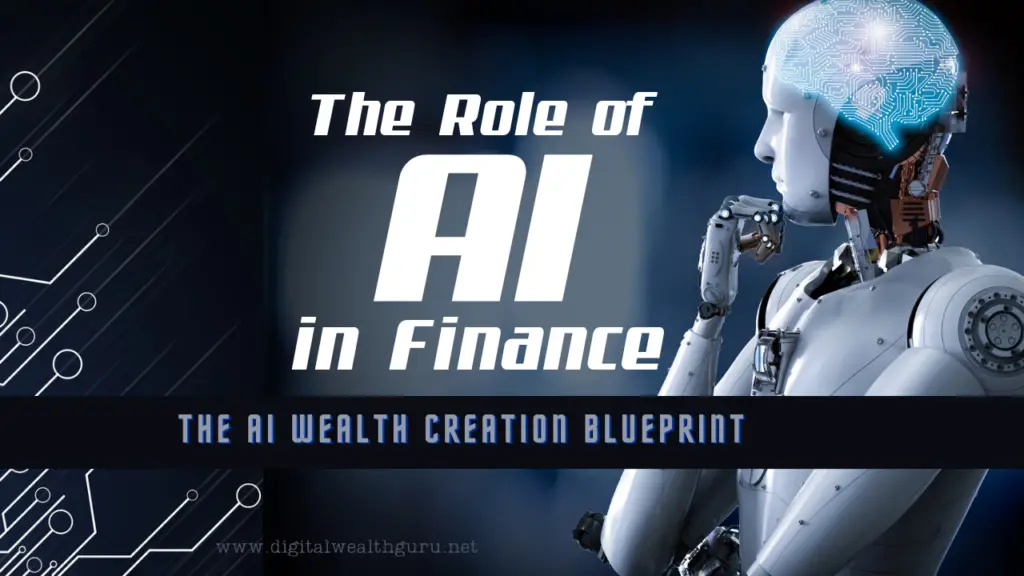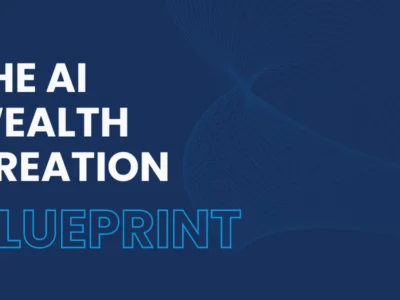Unveiling how AI is revolutionizing wealth creation and simplifying financial management.
Tired of the same old investment strategies? Dive into the future of wealth creation with Artificial intelligence (AI)! Discover how machine learning unlocks personalized insights, automates smart trades, and propels you towards financial freedom.
Unlocking Wealth: The AI Revolution in Wealth Creation
Have you ever wondered about the incredible surge in the number of millionaires, with fortunes soaring to new heights every year?
It’s not just traditional methods driving this wealth explosion; it’s the transformative power of Artificial Intelligence (AI).
In this blog post, we’ll explore the top 10 ways AI is reshaping the landscape of wealth creation.
1. Artificial Intelligence and the New Economy

In the dynamic landscape of modern economics, the advent of Artificial Intelligence (AI) has ushered in a paradigm shift, redefining the very essence of the economy.
The traditional pillars of economic growth, largely reliant on human labor, have given way to a new era driven by the unprecedented capabilities of digital technology and AI.
The Evolution of Economic Dynamics:
Historical Perspective:
Traditionally, the economy thrived on the backbone of human effort, where industries were powered by the physical labor and ingenuity of individuals. This era, while marked by significant achievements, also had limitations.
Access to capital and resources was a significant hurdle for many aspiring entrepreneurs, impeding the growth of self-made millionaires.
Rise of the Digital Economy:
Fast forward to the present, and we witness a profound transformation. The economy is no longer solely reliant on human labor; it is now propelled by digital technology and the intelligent algorithms that define AI.
Automation has emerged as a cornerstone, driving efficiency, reducing costs, and enhancing overall customer experiences.
AI as the Catalyst for Economic Growth:
Efficiency Enhancement:
AI has revolutionized how businesses operate, introducing a level of efficiency previously unimaginable. Automation of tasks that were once time-consuming and resource-intensive has become the norm.
From streamlined production processes to optimized supply chain management, AI is the catalyst for enhanced operational efficiency.
Cost Reduction:
The integration of AI has not only improved efficiency but has also led to significant cost reductions. Automated systems and intelligent algorithms contribute to minimizing operational expenses, allowing businesses to allocate resources more strategically and invest in areas that foster growth.
Customer Experience Enhancement:
One of the most tangible impacts of AI in the new economy is the transformation of customer experiences. AI-powered solutions, such as chatbots and personalized recommendation systems, have elevated customer interactions.
Businesses can now tailor their services, predict customer needs, and deliver more personalized and satisfying experiences.
The Economic Growth Trajectory:
Acceleration of Innovation:
AI’s role in the new economy extends beyond operational enhancements; it serves as a catalyst for innovation. Businesses leveraging AI are at the forefront of pioneering groundbreaking solutions.
The ability to analyze vast datasets, identify patterns, and derive actionable insights propels industries into new frontiers, fostering innovation and pushing the boundaries of what is possible.
Accessible Capital and Resources:
Unlike the constraints of the past, where limited access to capital hindered entrepreneurial endeavors, the era of AI has democratized opportunities. Entrepreneurs now have access to a wide range of tools and technologies that empower them to unlock wealth-building opportunities.
Automated investment services, predictive analytics, and other AI-driven tools level the playing field, allowing individuals and businesses alike to make informed and strategic financial decisions.
The integration of Artificial Intelligence into the economic landscape has brought about a profound transformation. The shift from human-centric to technology-driven economies has unleashed unprecedented possibilities.
AI not only enhances efficiency and reduces costs but also democratizes access to wealth-building tools. As we navigate this new economic frontier, embracing the transformative power of AI becomes paramount for those seeking to shape their financial destinies in this era of intelligent machines.
2. AI in Personal and Professional Brand Building

In the contemporary digital age, the significance of personal and professional branding has never been more pronounced. Leveraging Artificial Intelligence (AI) in this realm has emerged as a game-changing strategy, accelerating the process of brand development and growth.
Let’s delve into how AI transforms brand building on both personal and professional fronts.
Automated Content Creation:
AI-powered tools play a pivotal role in automating time-consuming tasks associated with content creation. Platforms like Copy AI and ChatGPT utilize advanced algorithms to generate compelling and contextually relevant content. This not only saves time but also ensures a consistent and engaging brand narrative across various channels.
Social Media Management:
Maintaining a robust presence on social media platforms is integral to effective brand building. AI platforms like Hootsuite enable automated social media management, from scheduling posts to analyzing engagement metrics.
This allows individuals and businesses to focus on crafting meaningful content while AI handles the intricacies of maintaining an active and influential social media presence.
Audience Engagement Optimization:
AI algorithms are adept at analyzing vast datasets to identify trends and patterns in audience behavior. By understanding audience preferences, AI facilitates personalized engagement strategies.
Whether it’s tailoring content to specific demographics or optimizing the timing of social media posts, AI ensures that brand communication resonates effectively with the target audience.
Brand Growth Insights:
AI goes beyond surface-level analytics, providing actionable insights for brand growth. These insights, derived from comprehensive data analysis, allow individuals and businesses to make informed decisions.
Understanding what resonates with the audience enables the refinement of brand strategies for continuous growth.
Personalization at Scale:
Personalization is a cornerstone of effective branding. AI excels at delivering personalized experiences at scale, tailoring content and interactions based on individual preferences. This not only enhances the user experience but also strengthens the emotional connection between the brand and its audience.
Visual Content Creation:
Visual appeal is a powerful element of brand identity. AI-powered tools like Canva assist in creating stunning visuals that align with the brand’s aesthetics.
From graphic design to video editing, these tools empower individuals and businesses to produce visually compelling content without extensive design expertise.
Trend Identification:
Staying relevant in a dynamic digital landscape requires the ability to identify and leverage emerging trends. AI algorithms analyze market trends and consumer behavior, providing insights that guide brand positioning. This proactive approach ensures that brands align with the evolving preferences of their audience.
Authority Establishment:
Building authority in a specific niche is a key aspect of personal and professional branding. AI tools help in identifying industry trends, competitor strategies, and content gaps.
By consistently providing valuable and authoritative content, individuals can position themselves as thought leaders in their respective fields.
The integration of AI into personal and professional brand building represents a transformative shift. Automation of repetitive tasks, personalized engagement, and data-driven insights empower individuals and businesses to navigate the complexities of the digital landscape with agility.
As AI continues to evolve, its role in brand building will likely become even more integral, offering innovative solutions for those looking to carve out a distinctive and influential brand presence.
3. Minimizing Investment Risks with AI

In the intricate world of investments, navigating risks and making informed decisions is a constant challenge. Artificial Intelligence (AI) has emerged as a powerful ally in this domain, offering tools and algorithms that can significantly minimize investment risks.
Let’s explore how AI is transforming the investment landscape and providing a strategic advantage to investors.
Predictive Analytics:
One of the standout features of AI in investment is its ability to predict market movements with a level of accuracy that traditional methods often struggle to achieve.
AI algorithms analyze vast datasets, identify hidden patterns, and forecast market trends. This predictive capability empowers investors to make informed decisions and capitalize on opportunities before they become widely apparent.
Real-time Market Insights:
AI-driven tools provide real-time insights into market dynamics. These insights go beyond historical data, allowing investors to stay abreast of current market conditions. Whether it’s sudden shifts in stock prices, changes in commodity values, or currency fluctuations, AI ensures that investors have up-to-the-minute information to guide their investment strategies.
Risk Assessment and Tailored Recommendations:
AI doesn’t just stop at predicting market movements; it extends to assessing an investor’s risk appetite and optimizing their investment portfolio accordingly. By understanding an individual’s financial goals, risk tolerance, and investment preferences, AI algorithms offer personalized recommendations. This tailored approach ensures that investment strategies align with the unique needs of each investor.
Portfolio Analysis and Diversification:
Maintaining a well-diversified portfolio is a fundamental strategy for risk mitigation. AI excels at portfolio analysis, evaluating the performance of various assets and recommending adjustments to optimize diversification.
This proactive approach helps investors spread risk across different investment avenues, reducing vulnerability to the volatility of any single market sector.
Dynamic Risk Management:
AI continuously monitors market conditions and dynamically adjusts risk management strategies. In the face of unexpected market events, such as economic downturns or geopolitical developments, AI systems can swiftly adapt investment portfolios to minimize potential losses. This agility in risk management is a valuable asset in the ever-changing landscape of global markets.
Behavioral Analysis:
Understanding investor behavior is a key aspect of risk minimization. AI analyzes investor sentiments, market sentiment, and behavioral patterns to gauge potential shifts in market dynamics.
By factoring in human emotions and reactions, AI contributes to a more comprehensive risk assessment, helping investors anticipate and navigate market fluctuations.
Fraud Detection and Security:
Investors face not only market-related risks but also the threat of fraud and security breaches.
AI employs advanced algorithms to detect anomalies and suspicious activities in financial transactions. This enhances the overall security of investment platforms, safeguarding investors against fraudulent schemes and ensuring the integrity of their financial transactions.
Continuous Learning and Adaptation:
One of the strengths of AI is its ability to continuously learn and adapt. As it processes more data and encounters diverse market scenarios, AI algorithms refine their predictive models. This continuous learning ensures that investment strategies evolve with the dynamic nature of financial markets, enhancing their effectiveness over time.
In the realm of investments, where uncertainty is inherent, AI stands as a formidable tool for risk minimization. Its predictive capabilities, personalized recommendations, and adaptability make it a valuable asset for investors seeking a strategic advantage.
As AI continues to advance, its role in shaping resilient and effective investment strategies is poised to become even more prominent, ushering in a new era of informed and risk-conscious investing.
4. Smart Money Management with AI

Smart money management is a cornerstone of financial success, and in the era of artificial intelligence (AI), leveraging advanced tools can elevate financial strategies to unprecedented levels. Let’s delve into how AI is revolutionizing money management, providing individuals with insights and capabilities that were once reserved for financial experts.
Automated Expense Tracking:
AI-driven tools like Mint and Kesho excel in automating the tracking of expenses. By analyzing transaction data, categorizing expenditures, and providing visual representations of spending patterns, these tools empower users to gain a comprehensive understanding of their financial habits.
This automation not only saves time but also enhances accuracy in budgeting and expense management.
Lightning-Fast Calculations:
AI can process vast amounts of financial data at lightning speed, enabling quick and precise calculations.
Whether it’s determining the impact of an investment decision, evaluating the cost-effectiveness of a purchase, or projecting future financial scenarios, AI tools like Wolfram Alpha and Numbrs perform complex calculations effortlessly, allowing users to make well-informed decisions promptly.
Trend Analysis and Pattern Recognition:
Money management goes beyond basic calculations; it involves understanding trends and identifying patterns in financial behavior.
AI excels in this aspect by analyzing historical data to recognize spending trends, investment patterns, and market behaviors. This insight enables users to make proactive decisions, capitalizing on favorable trends and mitigating risks associated with negative patterns.
Insights Beyond Human Capacity:
The sheer volume of financial data generated in today’s interconnected world exceeds the capacity of traditional financial management approaches.
AI processes this data comprehensively, uncovering insights that may elude human analysis. From identifying subtle changes in market conditions to recognizing opportunities for portfolio optimization, AI-driven tools offer a depth of analysis that surpasses human capabilities.
Personalized Financial Advice:
AI-powered financial advisory services, such as Betterment and Wealthfront, take money management to a personalized level. By considering an individual’s financial goals, risk tolerance, and investment preferences, these platforms offer tailored advice. This personalized approach ensures that money management strategies align with the unique circumstances and aspirations of each user.
Intelligent Savings and Investments:
Apps like Acorns leverage AI to automate micro-investing by rounding up daily purchases to the nearest dollar and investing the spare change. This intelligent approach to savings and investments, guided by AI algorithms, allows individuals to effortlessly grow their wealth over time. It’s a hands-off yet strategic way to participate in the financial markets.
Risk Mitigation and Asset Allocation:
AI contributes significantly to optimizing asset allocation and mitigating risks in investment portfolios. By assessing an individual’s risk profile and market conditions, AI algorithms recommend diversified portfolios that align with the user’s financial goals. This proactive risk management enhances the overall stability and resilience of investment strategies.
Real-time Financial Decision Support:
In the fast-paced world of finance, real-time decision support is invaluable. AI provides users with instant insights and recommendations based on the latest market data.
Whether it’s adjusting investment allocations, capitalizing on emerging opportunities, or responding to changes in financial circumstances, AI ensures that users can make timely and well-informed decisions.
Smart money management powered by AI transcends traditional financial practices. The automation, speed, and personalized insights offered by AI-driven tools empower individuals to navigate the complexities of personal finance with confidence.
As AI continues to evolve, its role in reshaping how we manage and grow our finances is set to become even more integral, offering a pathway to financial success that is both intelligent and accessible.
5. Accelerated Learning with AI

In the rapidly evolving landscape of knowledge acquisition, artificial intelligence (AI) is emerging as a transformative force, propelling the speed and efficacy of learning to unprecedented heights.
Let’s explore how AI is accelerating the learning process, revolutionizing education, and empowering individuals to absorb knowledge at an accelerated pace.
Personalized Learning Paths:
AI-driven educational platforms, such as Khan Academy and Duolingo, leverage sophisticated algorithms to assess individual learning styles, strengths, and weaknesses.
By analyzing user interactions and performance, these platforms tailor learning paths, ensuring that users focus on areas that need improvement while progressing swiftly through mastered concepts. This personalized approach maximizes efficiency and minimizes redundant learning.
Adaptive Learning Environments:
AI adapts to the learner’s pace, providing a dynamic and adaptive environment. Educational tools like DreamBox and Smart Sparrow adjust difficulty levels in real-time based on user proficiency, ensuring that learners are consistently challenged without feeling overwhelmed. This adaptability optimizes engagement and retention, fostering a continuous and efficient learning experience.
Intelligent Content Creation:
AI-powered tools, such as OpenAI’s GPT-3 and ChatGPT, are revolutionizing content creation in the education sector. These tools can generate high-quality educational content, explanations, and practice questions, saving educators time and diversifying learning materials.
The result is a wealth of diverse, AI-generated content that enhances the learning experience and caters to various learning preferences.
Real-time Feedback and Assessment:
Traditionally, feedback and assessment in education could be time-consuming and delayed. AI changes this paradigm by offering real-time feedback on assignments, quizzes, and assessments.
Platforms like Gradescope use AI to automatically grade exams, providing instant feedback to learners. This immediacy not only enhances the learning experience but also allows for prompt identification and correction of misconceptions.
Gamification for Enhanced Engagement:
AI contributes to the gamification of learning, turning education into an interactive and engaging experience. Platforms like Kahoot! and Classcraft leverage AI to create game-like environments where learners can compete, collaborate, and earn rewards. This gamified approach boosts motivation and enthusiasm for learning, fostering a positive and accelerated educational journey.
Predictive Analytics for Intervention:
AI utilizes predictive analytics to identify potential learning challenges before they become significant obstacles. By analyzing user behavior and performance data, AI algorithms can anticipate areas where learners might struggle. This foresight enables educators to intervene proactively, providing targeted support and resources to ensure continuous progress.
Continuous Adaptation to User Behavior:
AI learns from user interactions, constantly adapting its recommendations and content delivery based on individual preferences and learning styles. This continuous adaptation ensures that learners receive content in a manner that resonates with them, enhancing comprehension and retention.
This adaptive learning model mirrors the pace and preferences of each individual, promoting efficient and personalized learning experiences.
Access to a Global Knowledge Network:
AI connects learners to a vast global knowledge network. Platforms like Coursera and edX use AI to recommend courses based on user preferences and career goals. This interconnected network enables individuals to access diverse educational resources, collaborate with learners worldwide, and stay updated on the latest advancements in their fields.
Accelerated learning with AI transcends conventional educational methods, ushering in an era where the pace of acquiring knowledge is aligned with individual capabilities and preferences.
As AI continues to advance, its role in shaping the future of education promises a learning experience that is not only accelerated but also adaptive, engaging, and personalized. The fusion of artificial intelligence and education heralds a new frontier where the pursuit of knowledge is as dynamic as the minds seeking it.
6. Business Automation with AI
The integration of artificial intelligence (AI) into business operations is ushering in a new era of efficiency and productivity. Business automation powered by AI is transforming how companies operate, streamlining processes, and unlocking unparalleled opportunities for growth.
Let’s delve into the realm of business automation with AI and explore the myriad ways it is reshaping the landscape.
Streamlining Repetitive Tasks:
AI excels at handling repetitive and mundane tasks, freeing up valuable human resources for more strategic and creative endeavors. Automation tools like UiPath and Automation Anywhere leverage AI to perform tasks such as data entry, invoice processing, and document verification with precision and speed. This not only reduces the risk of errors but also allows employees to focus on higher-value activities.
Customer Service Chatbots:
AI-powered chatbots have revolutionized customer service by providing instantaneous responses to inquiries. These bots, fueled by natural language processing (NLP) and machine learning, can understand and respond to customer queries, resolve issues, and even initiate sales processes.
Businesses deploying AI chatbots, like those developed with ChatGPT, enhance customer satisfaction, ensure 24/7 availability, and reduce the workload on human customer support agents.
Intelligent Data Analysis:
AI-driven analytics tools, such as IBM Watson Analytics, enable businesses to extract meaningful insights from vast datasets. These tools go beyond traditional analytics by identifying patterns, trends, and correlations that may elude human analysis.
The result is data-driven decision-making, allowing businesses to make informed choices, optimize processes, and gain a competitive edge in their respective industries.
Inventory Management Optimization:
AI transforms inventory management by predicting demand, optimizing stock levels, and preventing overstock or stockouts. By analyzing historical data and external factors, AI algorithms, like those employed by tools such as Blue Yonder, enhance the accuracy of demand forecasts. This not only minimizes holding costs but also ensures products are available when customers need them, improving overall operational efficiency.
Automating HR Processes:
AI streamlines various Human Resources (HR) functions, from recruitment to employee management. Recruitment platforms like HireVue use AI to analyze video interviews, assessing candidate suitability based on facial expressions and responses.
Additionally, AI helps in employee onboarding, performance evaluations, and identifying patterns related to employee satisfaction, contributing to a more effective and data-driven HR strategy.
Enhanced Decision Support:
AI augments decision-making processes by providing valuable insights to business leaders. Tools like Salesforce’s Einstein Analytics use AI to analyze historical data, market trends, and customer behaviors, assisting executives in making informed decisions. This data-driven decision support ensures that businesses stay agile in dynamic environments and capitalize on emerging opportunities.
Dynamic Pricing Strategies:
In sectors like e-commerce and hospitality, AI-driven dynamic pricing strategies optimize product and service pricing based on real-time market conditions, demand fluctuations, and competitor pricing. Algorithms, such as those employed by companies like Dynamic Pricing, ensure that businesses remain competitive, maximize revenue, and adapt swiftly to market changes.
Supply Chain Optimization:
AI plays a pivotal role in optimizing supply chain operations. Predictive analytics, powered by AI, helps anticipate potential disruptions, optimize routes, and enhance overall supply chain efficiency. Platforms like Llamasoft leverage AI to model different supply chain scenarios, enabling businesses to proactively address challenges and improve resilience.
Business automation with AI is not merely a technological advancement; it’s a fundamental shift in how organizations operate and thrive in the modern business landscape.
By automating routine tasks, enhancing decision-making, and optimizing various processes, AI empowers businesses to unlock new levels of efficiency, innovation, and competitiveness. As businesses continue to embrace the transformative potential of AI, the era of intelligent automation is poised to redefine industry standards and drive sustained success.
7. Analyzing and Growing Businesses with AI
Analyzing and growing businesses with artificial intelligence (AI) introduces a paradigm shift in how companies approach data, strategies, and opportunities. Let’s explore the multifaceted ways AI contributes to the analysis and growth of businesses.
Actionable Insights through AI Analytics:
AI-driven analytics platforms, such as IBM Watson Analytics, empower businesses to extract actionable insights from vast datasets. These insights go beyond traditional analytics, uncovering patterns, correlations, and trends that might elude human analysis.
By leveraging AI in data analysis, businesses gain a comprehensive understanding of their operations, customer behaviors, and market dynamics, enabling data-driven decision-making.
Personalized Customer Experiences:
AI enhances customer interactions by tailoring experiences based on individual preferences and behaviors. Customer Relationship Management (CRM) systems, like Salesforce with Einstein Analytics, leverage AI to analyze customer data. This enables businesses to offer personalized recommendations, targeted marketing, and customized services, fostering stronger customer relationships and increasing customer satisfaction.
Predictive Analytics for Business Growth:
Predictive analytics, powered by AI algorithms, enables businesses to forecast future trends and behaviors. Tools like SAS Analytics use machine learning to analyze historical data, helping businesses anticipate market shifts, demand patterns, and customer preferences. This foresight facilitates proactive decision-making, allowing businesses to position themselves strategically in dynamic markets.
Market Expansion and Diversification:
AI aids businesses in identifying opportunities for market expansion and diversification. Analytical tools, such as Tableau and Power BI, leverage AI to process market data, competitor analyses, and consumer trends. By interpreting this information, businesses can make informed decisions on entering new markets, launching innovative products, or diversifying their offerings to meet evolving consumer demands.
Operational Efficiency with AI-Driven Automation:
Businesses achieve operational efficiency by automating processes through AI. Automation tools, like robotic process automation (RPA) platforms, streamline workflows, reduce errors, and enhance overall productivity. By implementing AI-driven automation, businesses can reallocate resources to strategic tasks, ensuring that operations are agile, cost-effective, and capable of scaling with growing demands.
Performance Metrics Optimization:
AI optimizes performance metrics by continuously analyzing and adjusting strategies. Tools like Google Analytics use AI to interpret website traffic, user behavior, and engagement metrics. Businesses can then refine marketing strategies, website design, and content delivery based on real-time insights, ensuring they stay aligned with their growth objectives.
Identifying Opportunities within Existing Operations:
AI-powered analytics, exemplified by tools like IBM Watson Analytics, help businesses unearth opportunities within their existing operations. By analyzing internal data, businesses can identify areas for improvement, cost-saving measures, and innovative approaches. This proactive approach to optimization ensures sustained growth and competitiveness in dynamic markets.
Strategic Planning and Decision Support:
AI acts as a strategic ally by providing decision support to business leaders. Platforms like Qlik Sense utilize AI to analyze vast datasets, helping executives make well-informed decisions. Whether it’s market entry strategies, investment decisions, or operational changes, AI-driven decision support ensures that businesses navigate complexities with confidence.
Analyzing and growing businesses with AI is not a one-size-fits-all approach but a dynamic strategy that adapts to the evolving business landscape. By harnessing the power of AI in analytics, automation, and decision support, businesses can not only understand their current standing but also pave the way for sustained growth, innovation, and resilience in an ever-changing market environment.
As AI continues to advance, its role in shaping successful business strategies becomes increasingly indispensable.
8. Discovering New Opportunities with AI
Discovering new opportunities with artificial intelligence (AI) revolutionizes the way individuals and businesses identify and tap into uncharted possibilities. Here’s a detailed exploration of how AI transforms the landscape of opportunity discovery:
Intelligent Data Exploration:
AI excels in processing vast datasets quickly and comprehensively. Tools like Google Cloud’s BigQuery utilize AI algorithms to uncover hidden patterns, correlations, and insights within large datasets. By intelligently exploring data, businesses can identify emerging trends, consumer preferences, and market gaps, paving the way for innovative opportunities.
Trend Analysis and Prediction:
AI-driven analytics, such as those offered by platforms like Trendalytics, enable businesses to analyze market trends and predict future developments. By understanding current trends and anticipating shifts, businesses can proactively position themselves to capitalize on emerging opportunities, ensuring they stay ahead of the competition.
Market Sentiment Analysis:
AI-powered sentiment analysis tools, like Brandwatch or IBM Watson, go beyond traditional market research. They analyze social media, customer reviews, and online conversations to gauge public sentiment. This provides businesses with valuable insights into consumer opinions, allowing them to identify areas for improvement, innovation, or new product/service development based on public feedback.
Competitive Landscape Assessment:
AI helps businesses assess the competitive landscape more comprehensively. Tools like Crayon use AI algorithms to track competitors’ activities, product launches, and market positioning. This information enables businesses to identify gaps in the market, areas where competitors may be falling short, and opportunities to differentiate themselves effectively.
Niche Market Identification:
AI assists in identifying niche markets and specialized opportunities that might be overlooked. Platforms like CB Insights leverage AI to analyze market segments, technology landscapes, and investment trends. This enables businesses to explore untapped markets, catering to specific needs and preferences that might not be adequately addressed by mainstream offerings.
Automated Market Research:
AI streamlines the market research process through automation. Tools like Crux Intelligence use AI algorithms to collect, process, and analyze market data, significantly reducing the time and resources traditionally required for comprehensive market research. This efficiency empowers businesses to conduct more frequent and targeted research, staying attuned to evolving market dynamics.
Innovation Identification:
AI fosters a culture of innovation by identifying areas where new technologies, products, or services can be introduced.
Innovation management platforms like Brightidea leverage AI to evaluate ideas, market trends, and technological advancements. This ensures that businesses not only identify opportunities but also have the tools to evaluate the feasibility and potential success of innovative ventures.
Uncovering Global Opportunities:
AI facilitates the exploration of opportunities on a global scale. Translation services powered by AI, such as Google Translate, break down language barriers, allowing businesses to analyze international markets more effectively. By understanding diverse markets, businesses can uncover global opportunities, expand their reach, and tap into previously inaccessible customer bases.
Discovering new opportunities with AI transcends traditional methods, offering a dynamic and data-driven approach to identifying unexplored possibilities. By leveraging AI in data exploration, trend analysis, sentiment assessment, and beyond, businesses can navigate the ever-evolving landscape with agility and foresight.
The continuous evolution of AI capabilities ensures that the process of opportunity discovery remains a powerful ally for those seeking to innovate, expand, and thrive in a rapidly changing business environment.
9. 10x Your Productivity with AI
Boosting productivity to unprecedented levels becomes achievable with the integration of artificial intelligence (AI). Here’s an in-depth exploration of how AI empowers individuals and businesses to 10x their productivity:
Automated Task Execution:
AI tools, such as Jasper.ai and ChatGPT, excel at automating repetitive tasks that consume valuable time. Content creation, data analysis, and routine communication can be efficiently handled by AI, freeing up human resources for more strategic and creative endeavors.
Content Generation and Editing:
In content-intensive domains, AI-powered tools like Copy.ai streamline the process of generating high-quality content. From blog posts to marketing copy, AI algorithms can understand context, tone, and style, providing drafts that can be refined by human editors. This collaborative approach accelerates content creation timelines.
Project Management and Coordination:
AI-driven project management tools, such as Monday.com or Trello, enhance coordination and task allocation. These tools leverage AI to optimize workflows, allocate resources efficiently, and predict potential project bottlenecks, ensuring smooth project execution and timely delivery.
Virtual Assistants for Organization:
AI-powered virtual assistants, like Google’s Assistant or Amazon’s Alexa, revolutionize organization and time management. They schedule appointments, set reminders, and answer queries, enabling individuals to focus on high-priority tasks without being bogged down by administrative details.
Data Analysis and Decision Support:
AI’s prowess in data analysis transforms decision-making processes. Tools like Tableau and Power BI utilize AI algorithms to process large datasets swiftly, providing actionable insights. This accelerates decision-making, empowering businesses to respond rapidly to market changes and opportunities.
Social Media Management:
For businesses and individuals managing multiple social media platforms, AI tools like Hootsuite offer efficient scheduling, content curation, and analytics. These tools enable users to maintain a consistent online presence without the time-consuming manual effort required for social media management.
Email Sorting and Response:
AI enhances email productivity by automating sorting and response processes. Platforms like Gmail use AI algorithms to categorize emails, prioritize important messages, and even suggest responses. This ensures that users can focus on critical communication without being overwhelmed by email volume.
Efficient Research Assistance:
AI-driven research tools, such as IBM Watson, augment the research process by swiftly analyzing vast amounts of information. Researchers can leverage AI to gather relevant data, identify patterns, and summarize findings, significantly reducing the time required for comprehensive research.
Personalized Learning Paths:
In educational and professional development settings, AI tailors learning experiences to individual preferences.
Platforms like Coursera or Khan Academy leverage AI algorithms to recommend courses, adapt learning materials based on progress, and create personalized learning paths. This accelerates skill acquisition and knowledge retention.
Streamlined Travel Planning:
For professionals on the move, AI simplifies travel planning. Apps like TripIt use AI to organize travel itineraries, provide real-time updates, and suggest alternative plans in case of disruptions. This ensures that individuals can focus on their objectives rather than dealing with travel logistics.
10xing productivity with AI involves harnessing its capabilities across diverse domains. From automating tasks to enhancing decision-making, AI empowers individuals and businesses to achieve more in less time.
Embracing these AI-driven productivity tools is not just an efficiency gain but a strategic move toward staying competitive in an increasingly fast-paced and dynamic world.
10. Launching AI Startups
Launching AI startups marks a pivotal step in leveraging the transformative power of intelligent machines to reshape industries and unlock unprecedented opportunities. Here’s an in-depth exploration of how launching AI startups can lead to impactful innovations and substantial contributions to the global economy:
Identifying Problem Areas:
Successful AI startups often begin with a clear focus on identifying problem areas or challenges within industries. By recognizing pain points, entrepreneurs can develop AI solutions that add significant value, whether it’s optimizing processes, improving customer experiences, or driving innovation.
Developing Tailored AI Solutions:
The core of an AI startup lies in developing tailored solutions that address specific industry challenges. This involves creating algorithms, machine learning models, or AI-driven applications designed to enhance efficiency, reduce costs, and bring about transformative changes in the targeted sector.
Industry-Specific Applications:
AI startups thrive when they align their innovations with industry-specific needs. Whether it’s healthcare, finance, manufacturing, or any other sector, successful startups tailor their AI solutions to address the unique requirements and challenges of the industry they aim to revolutionize.
Reshaping Industries:
The true power of AI startups lies in their ability to reshape entire industries. By introducing intelligent automation, data-driven decision-making, and innovative processes, these startups contribute to increased efficiency, reduced operational costs, and enhanced competitiveness within their respective sectors.
Securing Funding and Investment:
AI startups have witnessed substantial financial backing, with over $50 billion in funding received last year alone. Securing investment is crucial for research, development, and scaling operations. Investors recognize the potential of AI-driven innovations to create lasting impacts on global markets.
Economic Contributions of AI:
The AI revolution is projected to contribute $15.7 trillion to the global economy by 2030. This staggering figure highlights the economic significance of AI startups. Their advancements contribute not only to individual success but also play a vital role in driving economic growth on a global scale.
Problem-Solving Focus:
The most successful AI startups often have a problem-solving focus. By identifying pain points or industry challenges, entrepreneurs can develop AI solutions that address real-world problems. This approach ensures that the startup’s offerings meet genuine needs, increasing the likelihood of widespread adoption.
Driving Innovation:
AI startups act as catalysts for innovation within various sectors. By introducing cutting-edge technologies and novel approaches, these startups stimulate broader industry trends, encouraging established businesses to adapt and embrace AI-driven solutions to remain competitive.
Global Impact:
The global impact of AI startups extends beyond individual success stories. Their innovations influence markets, inspire new ways of thinking, and contribute to the ongoing evolution of industries worldwide. Successful AI startups become drivers of positive change on a global scale.
Seizing the AI Revolution:
As we witness the rise of AI startups, it’s evident that those who seize this incredible wave of innovation can create a lasting impact on the world. Embracing the AI revolution is not just about adopting the latest buzzword; it’s about harnessing the true power of intelligent machines to drive positive transformations in diverse sectors.
Launching AI startups goes beyond embracing technology; it’s about reshaping industries, driving innovation, and contributing to the global economy. The success of these startups hinges on their ability to identify challenges, develop tailored solutions, secure funding, and drive positive change.
As the AI revolution continues, startups that focus on real-world problem-solving are poised to make a lasting impact on the future of technology and business.
Conclusion: AI is Revolutionizing Wealth Creation
As we conclude this exploration into the revolutionary power of AI and wealth creation, one thing is clear: the future of financial success lies in embracing this transformative technology. The power of AI is within your reach, so don’t let this opportunity pass you by. Join the AI revolution, embrace the millionaire’s secret, and rewrite your financial destiny.
If you’ve made it this far, comment down below with the word “100” to let us know you watched the entire post. For more intriguing topics, watch the recommended video on the screen now. Thanks for reading!
Discover more from Digital Wealth Guru
Subscribe to get the latest posts sent to your email.







Comments